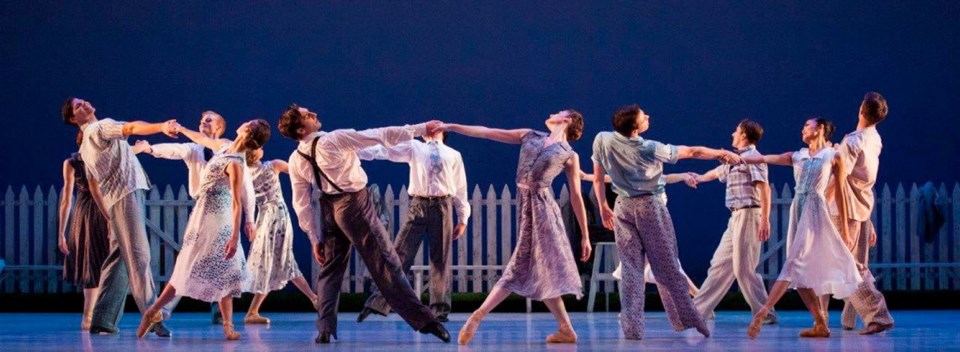What: Ballet West
Where: Royal Theatre
When: Friday, Saturday at 7:30 p.m.
Tickets: Starting $62 at rmts.ba.ca or 250 386 6121
When Ballet West performs in Victoria, the big question is: Which of the dancers will get stoned?
(Note: this has nothing to do with mind-altering substances.)
The Lottery is part of a mixed-repertoire program the Salt Lake City company will perform at the Royal Theatre on Friday and Saturday nights. Choreographed by Val Caniparoli, the dance work is based on a famous (and somewhat infamous) short story by Shirley Jackson.
Originally published in The New Yorker in 1948, The Lottery is about a seemingly normal American town that hosts a bizarre annual ritual. Using lottery slips, one citizen is selected to be stoned to death — a practice superstitiously believed to promote bountiful harvests.
Now considered a classic of American literature, Jackson’s story initially met with mixed reaction, with some readers finding it shocking. Even the writer’s mother deemed it “gloomy” and wondered why her daughter didn’t focus on more cheerful tales.
With 14 dancers dressed in costumes evoking the 1940s and ’50s, Ballet West’s The Lottery follows the short story quite closely. The twist, said artistic director Adam Sklute, is that each night, one dancer is selected by lottery (on stage) to be the stoning victim. This element of chance adds to the drama and intensity of the performance.
“Every person, man or woman, has to be ready [as the victim] to dance a very long, complicated solo at the end. Everyone else in the cast has to be prepared to react to the stoning differently, depending on who that character is in the community,” Sklute said this week.
Although it’s just a performance, playing the stoning victim can be an emotional experience, he added.
“I always think it’s fascinating when they’re opening their lots. They could be thinking, ‘Oh, please let it be me, I really want to do this tonight.’ Or, ‘Oh my gosh, I really don’t want to do this, please don’t make it be me.’ ”
Founded in 1963, Ballet West is renowned for both classical ballet and contemporary dance. In this troupe, the dancers, all with rigorous classical training, are also known for their height (some male dancers are in the six-foot-six range).
Sklute said, like George Balanchine, he prefers tall dancers for aesthetic reasons. Some have touted Ballet West as the “tallest ballet company” in the United States.
“Some people say that. I don’t think we’re necessarily in the Guinness Book of World Records or anything like that,” Sklute said with a laugh.
“I joke we represent the RockyMountain range, so we have to be as tall and dramatic as those mountains are.”
The other works to be performed in Victoria are Jodie Gates’s Mercurial Landscape (for eight couples) and In the middle, somewhat elevated, by William Forsyth.
Like The Lottery, Mercurial Landscape was choreographed specifically for Ballet West. It is set to a reimagining of Vivaldi’s Four Seasons created by Max Richter, titled Vivaldi Recomposed.
Now considered a classic of contemporary dance, In the middle, somewhat elevated created a stir when the Paris Opera Ballet premièred it 28 years ago. Described by The Guardian newspaper as “the work that changed ballet forever,” it is set to a thumping electronic score by Thom Willems. Forsyth exaggerated the balletic vocabulary in a (then) unconventional and energetic fashion, almost seeming to deconstruct the art form.
“It is one of the favourites of the dancers to dance as well, just because it is athletic and demanding,” Sklute said. “It remains as powerful and startling now as it did when it first came out in 1987.”
Sklute took over Ballet West in 2007 after having worked for 23 years with Chicago’s Joffrey Ballet, where Sklute was co-associate director. He was determined to raise Ballet West’s artistic standards. Yet, at the same time, Sklute aims to reach as wide an audience as possible.
With that in mind, he and the company agreed to participate in Breaking Pointe, a reality TV series about Ballet West that ran for two seasons starting in 2012.
Sklute acknowledged some “purists” may pooh-pooh the series as déclassé for a ballet company. While performance clips were included, producers focused on behind-the-scenes drama, such as romantic relationships between dancers.
Overall, it brought new audiences to Ballet West. A “handful” of people from around the U.S. continue to travel to their shows after watching the reality series, Sklute said.
“We weren’t doing this for the thousands who love ballet,” he said. “We were going to do this for the millions of people in the world who know nothing about it.”



